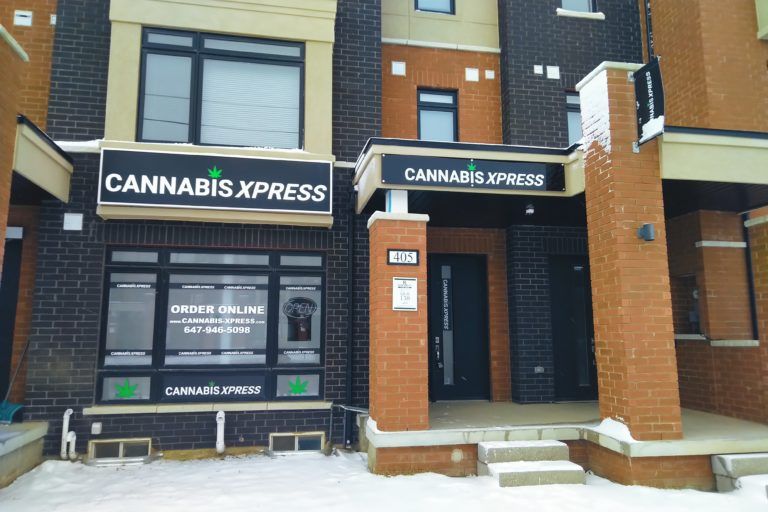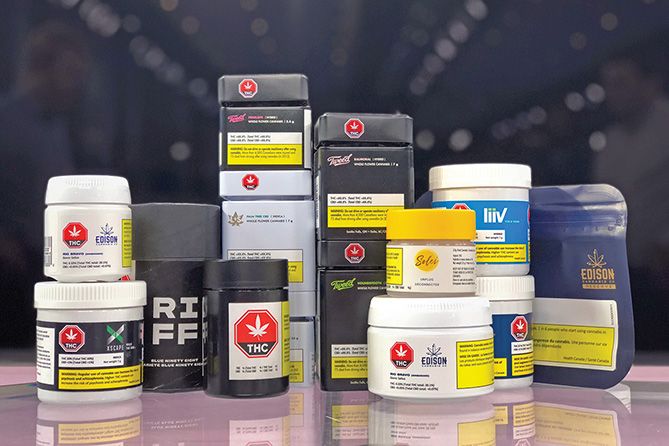As far as Chris Jones is concerned, sometimes you have to go small to make it big.
The veteran marijuana retail operator is wagering that small, convenience-style locations are the key to sustainable retail profitability in Ontario, the largest recreational cannabis market in Canada.
Jones’ latest marijuana retailer, Cannabis Xpress, plans to open its first store in the Toronto suburb of Brampton in early April.
The space will have a shop floor measuring only 80 square feet – roughly the size of two king mattresses laid side-by-side – and no more than two employees.
“The concept for this new round of stores is just keeping the locations very, very small and efficient,” said Jones, president of Cannabis Xpress and founder and former president of Star Buds Cannabis Co. in Ontario.
Additionally, Jones’ business plan involves:
- Initial openings in small and medium-sized Ontario markets, avoiding clusters of competing stores in urban cores.
- A limited inventory of cannabis products at competitive prices.
- Keeping initial build-out costs and operating costs low.
“That’s really the key to my business model, is just managing costs,” Jones said.
“If I can do that, then, in turn, I can still be profitable while undercutting all of the competitor stores.”
Small, convenient, low-cost stores
Jones’ plan for Cannabis Xpress involves small, convenient locations, initially targeting smaller local markets with less competition from existing stores.
In his view, many existing cannabis stores in Ontario are simply too large.
That might have made sense back when Ontario was issuing a limited number of store licenses by lottery, he said, “but I think people didn’t really adapt to how the market changed over time.”
At least 545 cannabis stores are currently licensed for business in Ontario, although Jones estimates that perhaps 60% of those stores are actually open. The province is now licensing as many as 120 new stores per month.
With so much competition, Jones believes it’s unlikely a given store can attract enough customers to justify a large retail footprint.
Including the 80-square-foot shop floor for customers, the inaugural Cannabis XPress Brampton location measures only 353 square feet in total.
That’s far smaller than competing stores, according to Robert Stepak, a Colliers real estate broker who specializes in Ontario cannabis real estate.
“Generally speaking, the vast majority of cannabis leases out there right now are probably in the range of anywhere from 1,200 to 1,500 square feet,” Stepak said.

Jones said the total cost of the Brampton store was less than 50,000 Canadian dollars ($40,000), excepting the initial inventory purchase.
Such a small store will require only one or two employees working at a time, thus reducing labor costs.
“Some of these people are just spending a million dollars to open up this really fancy store, and we’re all just selling the same products,” Jones said, referring to Ontario’s monopoly cannabis supplier, the government-owned Ontario Cannabis Store.
“If someone spent a million dollars on a store, and I open up a store right beside them for CA$50,000, and I look at their menu, and I stock the exact same products as them, and I have two people working instead of 10 in the store beside me, who’s actually going to be more profitable?”
Cannabis Xpress menus will feature 50 core stock-keeping units, plus five or 10 more SKUs “tailored to the local market,” which Jones believes will boost efficiency by speeding up customer throughput.
A second location, planned for Uxbridge, Ontario, will measure 800 square feet in total with a shop floor of about 350 square feet.
Jones aims to open at least five Cannabis Xpress locations in Ontario by the end of 2021.
Ontario’s retail real estate market
Jones said monthly rent and utilities for the Brampton Cannabis Xpress store will be less than CA$1,400 per month, including taxes, or less than CA$4 per square foot.
The 353-square-foot location is unusually cheap.
Real estate broker Stepak said a typical lease for a marijuana store in a strip plaza outside of major Ontario urban cores might cost at least CA$35 per square foot, depending on the location and other factors.
When the Ontario market was younger and licenses were more limited, Stepak said, typical cannabis retailers were in the market for larger stores ranging from 2,000 to 3,000 square feet.
“After the lottery, after COVID, the model shifted where everyone decided to go a little bit smaller – they realized they didn’t need the big space, they were generating the same revenue, and they could go a little bit smaller,” Stepak said.
The smallest Ontario marijuana store Stepak has seen measured roughly 500 square feet; the largest was about 7,500 square feet.
A year or two ago, Ontario cannabis retailers were paying premiums for leases and “offering landlords essentially whatever they wanted,” Stepak said.
That practice isn’t sustainable, he added.
“As you’ve probably seen, a number of cannabis companies have already gone under because they couldn’t sustain themselves with paying that premium,” he said.
“This is still retail at the end of the day – it’s still hypercompetitive. So you need to have your margins set accordingly, and you need to make sure that your risk is mitigated as much as possible.”
Lessons from retail experience
During his time with Star Buds in Ontario, Jones worked in the stores, where he said he learned important lessons about what cannabis shoppers want.
In Jones’ experience, many customers are still shopping based on a simple criteria: the highest THC content for the lowest price.
“For the most part, people don’t care about brands, and they just want to get value for their money … and then they just want to get in and get out.”
Jones plans to implement a price guarantee to beat prices from nearby retailers.
“I know I’m not just going to beat competitors on convenience only,” he said, “it needs to be a bunch of factors put in.
“But if I’m convenient, I have what you want and I’m noticeably cheaper, then where would you shop?”
Jones expects that many Ontario marijuana stores will struggle in the months to come and he’s waiting for a number to go out of business before potentially bringing Cannabis Xpress to larger urban markets such as Toronto.
“I think there’s going to be a lot of stores that are going to be up for sale in the next six to eight months,” he said, “and a lot of people that are just going to get out of this business who thought they were going to get rich and just realized how challenging it is to be successful.”
Solomon Israel can be reached at solomon.israel@mjbizdaily.com.





